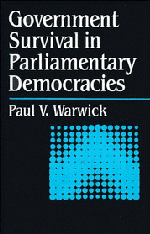Book contents
- Frontmatter
- Contents
- List of tables and figures
- Preface
- GOVERNMENT SURVIVAL IN PARLIAMENTARY DEMOCRACIES
- 1 Introduction: the government survival debates
- 2 The quantitative study of government survival
- 3 Basic attributes and government survival
- 4 The role of ideology
- 5 Economic conditions and government survival
- 6 The underlying trend in government survival
- 7 Model adequacy
- 8 Conclusion: an alternative perspective on government survival
- Appendix: a codebook of variables used in this study
- Notes
- References
- Index
2 - The quantitative study of government survival
Published online by Cambridge University Press: 19 September 2009
- Frontmatter
- Contents
- List of tables and figures
- Preface
- GOVERNMENT SURVIVAL IN PARLIAMENTARY DEMOCRACIES
- 1 Introduction: the government survival debates
- 2 The quantitative study of government survival
- 3 Basic attributes and government survival
- 4 The role of ideology
- 5 Economic conditions and government survival
- 6 The underlying trend in government survival
- 7 Model adequacy
- 8 Conclusion: an alternative perspective on government survival
- Appendix: a codebook of variables used in this study
- Notes
- References
- Index
Summary
The rapid evolution in research on parliamentary government survival in recent years has involved a major shift in methodology from regression approaches to event history analysis. This shift brings with it several advantages, including a more satisfactory treatment of “artificial” government terminations, the possibility of incorporating time-varying covariates, and the capacity to estimate the effects of unmeasured time-dependent factors. It also involves the loss of a familiar signpost of empirical success for political scientists, the coefficient of determination (R2). Because event history methodology is relatively unknown in political science, this chapter presents a brief development of its guiding principles and the manner in which it will be utilized for the investigation of government survival.
THE “EVENTS” METHODOLOGY
The most suitable way of introducing event history analysis in the present context is to trace the steps that led to its emergence in the government survival literature. The purposes of orienting the discussion in this manner are threefold: (1) to add methodological substance to the review of recent developments presented in the previous chapter, (2) to specify more precisely the nature of the deficiencies in that work, and (3) to indicate the ways in which these deficiencies will be tackled in this study. Because the discussion keeps technical details to a minimum, interested readers may wish to consult other sources, such as Tuma and Hannan (1984), Kiefer (1988), and Blossfeld, Hamerle, and Mayer (1989), for more complete treatments.
- Type
- Chapter
- Information
- Government Survival in Parliamentary Democracies , pp. 17 - 33Publisher: Cambridge University PressPrint publication year: 1995



